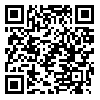BibTeX | RIS | EndNote | Medlars | ProCite | Reference Manager | RefWorks
Send citation to:
URL: http://ismj.bpums.ac.ir/article-1-732-en.html

 , Maryam Khosravi1
, Maryam Khosravi1 
 , Fatemesadat Hoseini Namvar1
, Fatemesadat Hoseini Namvar1 
 , Badri Zarrin Ehteram1
, Badri Zarrin Ehteram1 
 , Nahid Sarahian1
, Nahid Sarahian1 
 , Hedayat Sahraei *2
, Hedayat Sahraei *2 

2- Neuroscience Research Center, Baqiyatallah [a.j.] University of Medical Sciences, Tehran, Iran ,
Background: Calorie input reduction (CIR) can improve central nervous system functions. However, there is no study dealing with the effect of CIR on the hypothalamic-pituitary-adrenal (HPA) axis activity as the main neuro-endocrine system in this regard. In the present study, the effect of CIR (intermittent feeding) on metabolic responses to stress was examined.
Material and Methods: Female mice with an average weight of 27 ± 3 g were divided into 4 groups of 7. The control group received adequate food and water without stress. The second group was deprived from food (2 hours/day for seven consecutive days) and then electro foot-shock stress was applied to them for 4 days. The third group was deprived from food 2 hours/day for a week, and the fourth group received 4 days of electric shock without food deprivation. Blood samples were collected from all animals for plasma corticosterone evaluation.
Results: Stress and intermittent food increased plasma corticosterone levels while intermittent feeding when combined with stress, no increment was observed in plasma corticosterone level. Stress decreased food intake, but the intermittent feeding with or without stress increased food intake. Stress and intermittent feeding decrease delay to eating time whereas this was opposite in the group in which received both stress and intermittent feeding. Stress and intermittent feeding did not affect the animal's weight gain. In addition, fecal material was decrease in groups experience stress, intermittent feeding and stress in combination with intermittent feeding.
Conclusion: Intermittent feeding inhibits stress-induced metabolic responses. This inhibition in plasma corticosterone level, feeding and weight gain were observed.
Received: 2014/08/26 | Accepted: 2014/11/16 | Published: 2015/11/8
| Rights and Permissions | |
 |
This work is licensed under a Creative Commons Attribution-NonCommercial 4.0 International License. |




